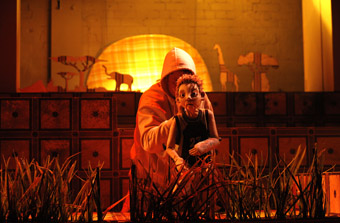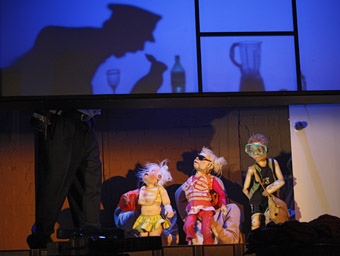child flight, adult plight
jana perkovic: my darling patricia’s africa

Africa, My Darling Patricia
photo Jeff Busby
Africa, My Darling Patricia
A SUBURBAN HOUSE MADE DISHEVELLED BY CHILDREN: A TERRACED STAGE, FOUR SHALLOW LEVELS OF KHAKI-COLOURED LINO, WELL-WORN FURNITURE, ENGULFED BY THE ORGANIC, OVERGROWN MESS OF PLASTIC TOYS AND WASHING. MY DARLING PATRICIA’S AFRICA, A LITTLE DITTY TO EARLIEST CHILDHOOD, PRESENTS LIFE AS SEEN FROM THE FLOOR. FOR THREE LITTLE CHILDREN, THE SHOW’S PROTAGONISTS, THIS KNEE-DEEP DOMESTIC JUNGLE IS A SPACE OF ENDLESS ADVENTURE. ADULTS, UPSTAGE, ARE REDUCED TO HEADLESS LEGS, ENACTING VERY SERIOUS-LOOKING, BUT INCOMPREHENSIBLE SCENARIOS.
From one visually splendid work to another, My Darling Patricia have been exploring the fraught worlds of the women who raise us: from our starchy, repressed grandmothers, who sabotaged regimented dinner parties in Politely Savage and retreated into gothic, self-annihilating fantasies, to the sedated, distant mothers of Night Garden, wandering through fragile glasshouses in synthetic nightgowns, too distant to comfort. Despite the apparent focus on children’s imagination, it is the tough, suburban single mother, embodied with empathetic grace by Jodie Le Vesconte, who is the complex centre of this new work. Tripping over neglected laundry baskets, she juggles an unreliable boyfriend, hostile social services and temperamental children, in turns neglectful and protective, vicious and affectionate.
Africa could have been a garden-variety condemnation of bogan Australia, depicting the working classes as a social stratum plagued by domestic violence, alcoholism and child abuse. Instead, three children remain sovereign in this domestic chaos, living richly imaginative lives. A documentary on Africa, transformed through their unformed yearnings, becomes the ordering structure for their world. Angry adults roar like lions, a little girl imagines herself a flamingo, and when suburban life becomes unsatisfying they pack their little backpacks and attempt to board the first plane to the savanna.

Africa, My Darling Patricia
photo Jeff Busby
Africa, My Darling Patricia
Patricias endow the puppets with a magnificent fluidity of movement. Operated by multiple puppeteers, bunraku-style, three children truly come to life, with a verisimilitude of attitude real actors could not even approximate, and with beautifully observed details: dancing, moonwalking, gasping for air mid-sob, launching into a cacophony of tantrums when their Christmas presents, gifts from their mother’s ex, are taken away. The older girl accuses her of not being her real mother and threatens to get Madonna to adopt her. Curled up on the floor once the fight has subsided, she pokes her mother’s behind, annoyed that she is focusing on the other sister.
Everyday activities in families fatigued by child-raising gravitate towards the ground, where all adult activity seems a tad less real. The cruelty and the tenderness of this family is all conducted among the washing and the toys; the uppermost level reserved for faceless, abstract conflicts: with the police, institutions, neighbours.
Children’s lush, robust escapism gives way to an uncharacteristically naturalistic denouement. Having erred on the impressionistic side before, Patricias now settle for unadorned, complicated realism. The family has to leave; little friends are separated. Arresting imagery swept aside, one boy is left behind on the bare lino, on which a miniature silhouette savanna emerges, but only momentarily. It is a courageous choice. Africa remains a show about a mother, and childhood as it is: difficult, bearable, un-tragic.
My Darling Patricia, Africa, concept, design, creation My Darling Patricia, concept Sam Routledge, writer, director Halcyon Macleod, design Clare Britton, Bridget Dolan, performers Jodie Le Vesconte, Matt Prest, puppeteers Clare Britton, Alice Osborne, Sam Routledge, composer, sound designer Declan Kelly, lighting Lucy Birkinshaw, puppets Bryony Anderson; Malthouse Theatre, Melbourne, Nov 12-29
RealTime issue #94 Dec-Jan 2009 pg. 40






